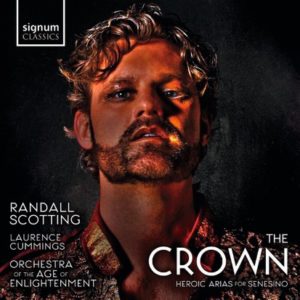
CD Review: Randall Scotting’s ‘The Crown’
By Bob DieschburgSenesino: brilliant, noble, incomparable, dignified, and boasting a superb technique that allowed the world famous castrato to have impeccable diction coupled with just as formidable breath control… Sheer endless is the series of superlatives with which this multifaceted artist has been credited. Not to mention the adventurous, sometimes stormy and humorous episodes which, for more than three centuries, have cemented the legend of his life (ranging, to record but a few, from the friendship and subsequent feud with Händel to a curious duet with Maria Theresa, the future Empress of the Holy Roman Empire, in Florence in 1739).
However, little is remembered about Senesino outside his association with Händel at the Royal Academy of Music and the bulk of the 112 operas in which he is known to have performed during his 40 years on stage is (nearly) forgotten.
It has indeed taken the learnedness of American countertenor Randall Scotting to not only search the musical archives of the United States and Europe but also to record what hidden gems he was able to discover in a groundbreaking new release dedicated to the Sienese castrato which is, very fittingly, titled “The Crown.”
An 18th Century Treasure Trove
Published by Signum Classics, “The Crown” features 18 arias – 13 of which are world premiere recordings – by composers as widely and unjustly neglected as Attilio Ariosti, Giovanni Giaj, and Giovanni Alberto Ristori whose work has, in parts, been lost in the WWII bombings of Dresde.
No doubt the Baroque enthusiast will find plenty to cherish, including a selection of arias from Giaj’s 1737 classical drama of “Eumene” which – thanks to its relatively low tessitura – gives an accurate measure of Randall Scotting’s very masculine, imposing tone and style.
In both “Ricordati che offesa” and “Fra l’orror d’atra foresta” (which, incidentally, makes a psychologically compelling use of French horns) our countenor relies on the heft of his chest voice to effectively substantiate the line in a series of cadenzas and mordents. Meanwhile, his sound retains all the qualities of a warm alto, even after the many interval leaps in “Fra l’orror d’atra foresta.”
In this, he markedly stands apart from some of his colleagues, including from the roster of the Metropolitan Opera, as the timbre, virile and layered, barely subsides to the airiness or, improperly, thinness that a lighter voice may produce. Instead, it remains firmly grounded in the velvety riches of its essentially baritonal core.
Dramatic Artistry
As for dramatic insight, Scotting offers a highly diverse set of characters whose emotions he convincingly anatomizes in their every nuance and this, I should add, within different sections of a single aria or even bars.
In “Dolce sogno,” for instance, he moves between the amorous feelings of the Sicilian King Gualtiero and his natural anguish when serenading the beautiful Griselda. The messa di voce is impeccable (as when the voice is dying down on “crudel”) and the dynamics and colors modulated as to suggest the veiled, intimate atmosphere of the scene’s pastoral setting.
Overall, the artistic choices made by the Minnesotan countertenor seem to accentuate psychological incisiveness over any attempt at producing art for art’s sake. The diminutions, though polished, are somewhat restrained and the ornaments, as in the roulades of Orlandini’s “Vedrò più liete,” do not have the self-serving undertone that, for better or for worse, may have derived from the virtuoso tradition.
A Debut of Musicological Significance
Very much the same holds true for the excellent playing of the Orchestra of the Age of Enlightenment. At its helm, Laurence Cummings sensibly strikes a balance between showcasing instrumental bravura and accompanying his primo uomo.
Two interludes entirely belong to the orchestra and nicely vary “The Crown’s” highly ambitious program. The album is indeed revelatory and significant beyond its being the debut album of Randall Scotting.
It is a work of scholarly mastery and the result of long preliminary studies on Senesino and his surroundings for which Scotting earned his PhD at the Royal College of Music. I personally have listened to “The Crown” with his thesis in hand and have only started to get a full grip on the revivalist passion involved!


